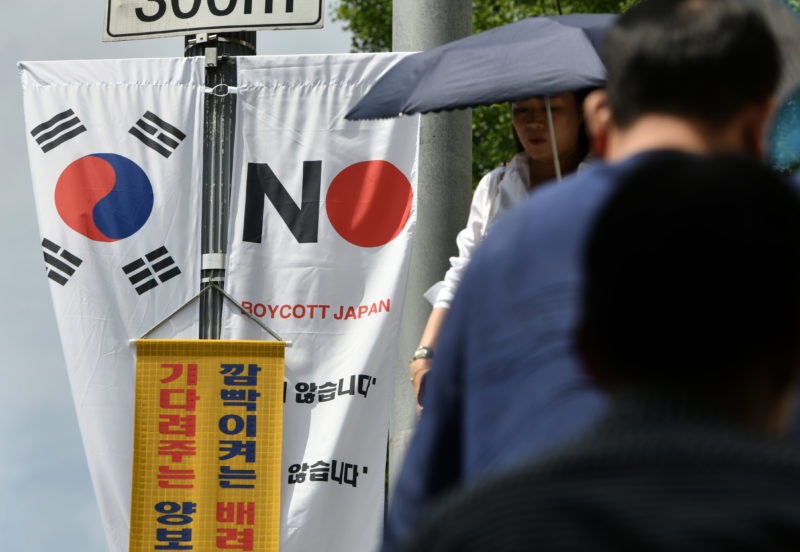Japan-South Korea spat an economic lose-lose
Feelings are running high in South Korea, where a boyoctt of Japanese goods and services is gathering pace (Jung Yeon-je)
Tokyo (AFP) – A diplomatic spat that prompted Japan and South Korea to downgrade trade and military ties is an economic lose-lose, experts say, with both countries already feeling the impact.
South Korean firms are now scrambling to find alternative suppliers beyond Japan, while Japan’s tourism industry is counting the cost of plunging visitor numbers from South Korea.
The dispute stems from of a long-running disagreement over Japanese use of forced labour in South Korea during World War Two.
A series of South Korean court rulings have demanded Japanese companies compensate victims, but Tokyo says the issue was settled by a reparations package agreed decades ago.
As ties worsened, Japan imposed restrictions on the export of chemicals key to the South Korean chip and phone industries, and this week removed Seoul from a favoured trading partner ‘white list.’
The moves have forced South Korean electronics giants like Samsung, LG and SK Hynics to hunt for suppliers elsewhere in the hope of reducing their dependence on Japanese manufacturers.
In early August, the South Korean government promised the sector a major injection of funds — around $37 billion — to help achieve a long-term goal of self-sufficiency for 100 components for the country’s industry.
In the meantime however, South Korea’s “overall business ecosystem” remains vulnerable, particularly small and medium-sized businesses, according to Kwon Tae-shin, head of the Korea Economic Research Institute.
The country’s export-oriented economy was already suffering the effects of the US-China trade war and the global economic slowdown.
“Six out of 10 small and mid-sized firms will not be able to stand the measures for more than six months,” he warned.
– Tourism troubles –
On the Japanese side, authorities have played down the impact of the moves, insisting the new rules simply put South Korea on the same level as many other trading partners.
Japanese industry is also not likely to suffer “serious damage” from retaliatory measures South Korea will implement from September, Yasuo Imanaka, chief analyst at Rakuten Securities, told AFP.
That is in part because Japan is much less dependent on South Korean products than vice-versa.
A senior official at a leading Japanese firm said the economic impact for both countries was “very overestimated.”
“It’s essentially a political matter,” he said.
But parts of the Japanese economy have seen collateral damage, including the tourism industry.
South Koreans were the second largest contingent of foreign visitors to Japan last year, just behind visitors from China, according to the Japan National Tourism Organisation.
But their numbers fell 7.6 percent in July from a year earlier, according to JNTO figures, with the trend expected to worsen given the plunge in August and September reservations seen by major Japanese tourism agency JTB.
– Beer boycott –
In the short-term, the sector can count on a boost from the Rugby World Cup being hosted from September, which is expected to draw 400,000 foreign fans.
And a rise in Chinese visitors — numbers were up 19.5 percent in July — as well as next year’s Olympic Games in Tokyo may also provide solace.
The diplomatic spat has had other economic impacts in the form of boycotts in South Korea of Japanese products from clothing to alcohol.
Major Japanese brewers including Kirin, Asahi, Sapporo and Suntory have found themselves targeted.
South Korea accounted for 61 percent of Japanese beer-makers’ exports last year, and imports were down 45 percent in July from June according to South Korean customs.
Japanese fashion giant Fast Retailing has also been hit by a boycott affecting its Uniqlo brand, which counts South Korea as a major market with nearly 190 outlets.
But the effects are also being felt in South Korea, where local airlines have been forced to reduce flights to Japan on declining demand.
And even the boycott of Uniqlo has a knock-on effect, because the firm is managed in South Korea by a joint venture in which South Korea’s Lotte holds a 49 percent stake.
Disclaimer: Validity of the above story is for 7 Days from original date of publishing. Source: AFP.


